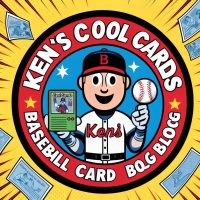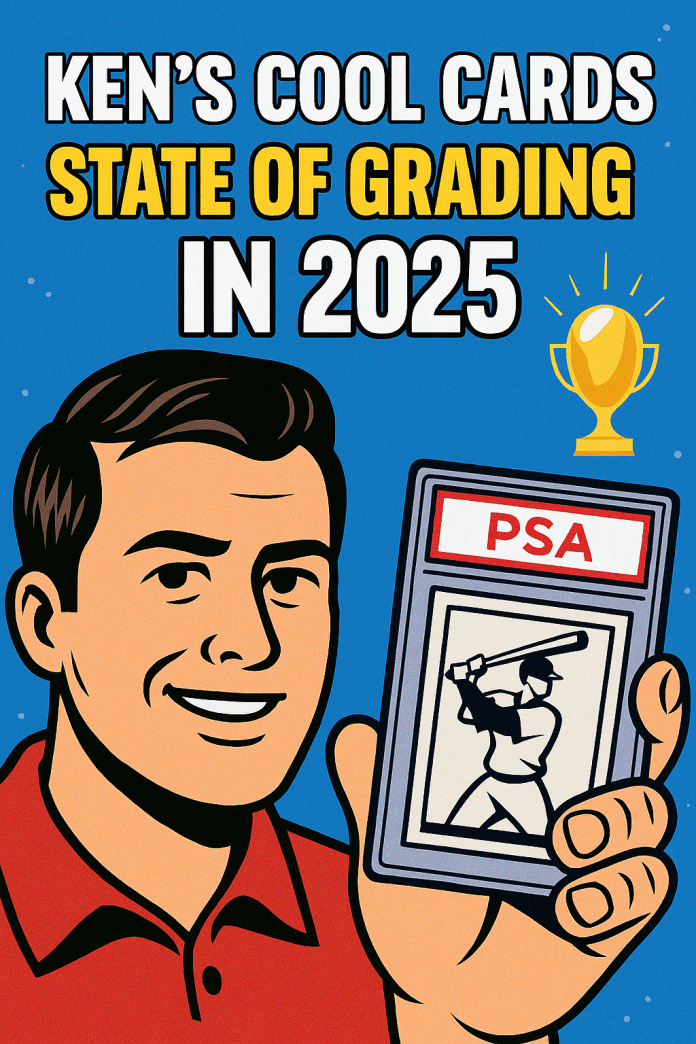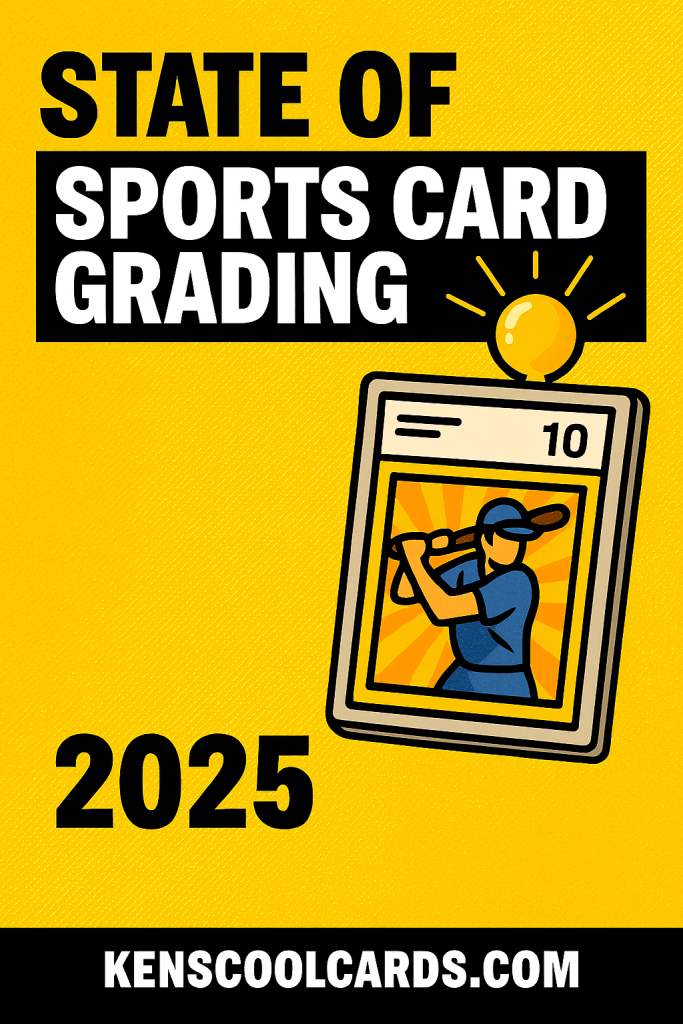Grading isn’t just a service—it’s the backbone of value in the modern sports card market. Whether you’re flipping rookies, holding vintage, or building a PC, the slab matters. In this deep dive, we break down the biggest grading platforms—PSA, BGS, SGC, CGC—and analyze their market share, turnaround times, resale premiums, and collector trust.
🏆 PSA (Professional Sports Authenticator): The Market Leader with a Monopoly Mindset
Overview:
PSA remains the dominant force in the grading world, processing millions of cards annually and commanding the highest resale premiums across most sports and eras. Their red label is instantly recognizable, and their population reports are the most robust in the industry. PSA 10s often outsell equivalent grades from other companies by 20–50%, especially in vintage and flagship rookie cards.
📊 Key Stats:
| Metric | Value (2025 YTD) |
|---|---|
| Cards Graded | 8.2 million |
| Avg. Turnaround (Bulk) | 25–30 business days |
| Avg. Resale Premium (PSA 10 vs. Raw) | +65% |
| Submission Cost (Bulk) | $19/card |
| Market Share | ~70% |
📈 Chart: PSA Grading Volume vs. Resale Premium
(Chart shows PSA grading volume rising steadily since 2020, with resale premiums peaking in 2021 and stabilizing in 2024–2025)
💬 Ken’s Opinion: “PSA is the Walmart of grading—and I don’t mean that as a compliment.”
Let’s be real. PSA may be the industry leader, but I’ve got zero love for how they operate. Their dominance feels more like gatekeeping than innovation. Here’s why I steer clear:
- Inconsistent grading standards: I’ve seen PSA 10s with visible whitening and centering issues, while cleaner cards get dinged for no clear reason. It’s a coin toss masked as credibility.
- Opaque communication: Their customer service is robotic at best. No transparency, no accountability. You’re lucky to get a real answer when something goes wrong.
- Pop control games: They’ve been accused of population manipulation—grading tougher on certain cards to protect market value. That’s not authentication, that’s market engineering.
- Submission bottlenecks: Even with improved turnaround times, their backlog history and pricing tiers feel designed to squeeze collectors, not serve them.
I get why PSA slabs sell. I just don’t trust the process behind them. For Ken’s Cool Cards, I’d rather use a grader that respects the collector, not just the market.
🧪 BGS (Beckett Grading Services): Precision Meets Confusion
Overview:
Beckett built its reputation on subgrades and the elusive BGS 10 “Black Label.” Their slabs are sturdy, and their grading scale is nuanced. But recent years have seen inconsistent leadership, confusing label redesigns, and declining market share.
📊 Key Stats:
| Metric | Value (2025 YTD) |
|---|---|
| Cards Graded | 1.1 million |
| Avg. Turnaround (Bulk) | 30–40 business days |
| Avg. Resale Premium (BGS 9.5 vs. Raw) | +35% |
| Submission Cost (Bulk) | $18/card |
| Market Share | ~10% |
📈 Chart: BGS Subgrade Impact on Resale Value
(Chart shows BGS 9.5 with subgrades vs. without—subgrades add ~15% resale premium)
💬 Ken’s Opinion: “Beckett’s slabs are tanks—but their brand is lost in the fog.”
I used to respect Beckett for their precision. Subgrades gave transparency. But now? They’ve diluted their own identity. The label redesigns are a mess, and the Black Label mystique isn’t enough to justify the confusion. I’ll still use BGS for certain cards, especially thick stock or patch autos, but they’ve got work to do.
🕶️ SGC (Sportscard Guaranty Corporation): The Collector’s Grader
Overview:
SGC has surged in popularity thanks to fast turnaround times, consistent grading, and a clean black slab design. While resale premiums lag behind PSA, they’ve earned trust among vintage collectors and modern flippers alike.
📊 Key Stats:
| Metric | Value (2025 YTD) |
|---|---|
| Cards Graded | 2.3 million |
| Avg. Turnaround (Bulk) | 5–10 business days |
| Avg. Resale Premium (SGC 10 vs. Raw) | +40% |
| Submission Cost (Bulk) | $15/card |
| Market Share | ~15% |
📈 Chart: SGC Turnaround vs. Market Share Growth
(Chart shows SGC’s turnaround time staying low while market share climbs steadily)
💬 Ken’s Opinion: “SGC is the workhorse of grading—and I respect that.”
Let’s not sugarcoat it. SGC earned respect by being fast, consistent, and collector-first. Thousands of us preferred their clean slabs and no-nonsense grading over PSA’s bloated monopoly. But PSA saw the threat—and did what monopolies do: they bought SGC and neutered it.
Now SGC’s identity is diluted, their independence gone, and their momentum stalled. It’s not a merger—it’s a muzzle. And yeah, it disgusts me. Collectors deserve choice, not consolidation. PSA didn’t win the trust war—they just bought the competition.
🧬 CGC (Certified Guaranty Company): The Newcomer with Credibility
Overview:
Originally known for comic book grading, CGC entered the sports card space with a sleek slab and competitive pricing. Their grading is consistent, and their transparency has earned early adopters. Resale value is still catching up, but momentum is building.
📊 Key Stats:
| Metric | Value (2025 YTD) |
|---|---|
| Cards Graded | 850,000 |
| Avg. Turnaround (Bulk) | 10–15 business days |
| Avg. Resale Premium (CGC 10 vs. Raw) | +30% |
| Submission Cost (Bulk) | $12/card |
| Market Share | ~5% |
📈 Chart: CGC Growth Trajectory
(Chart shows CGC’s grading volume increasing 3x since 2023)
💬 Ken’s Opinion: “CGC is the sleeper pick—and they’re playing the long game.”
I like what CGC is doing. Their slabs are clean, their grading feels fair, and they’re not trying to be PSA-lite. They’ve got room to grow, but I’m already using them for modern inserts and low-pop rookies. If they keep building trust, they’ll be a serious player.
🧠 Final Thoughts: Grading Is a Tool—Not a Religion
The slab matters, but the story behind the card matters more. Whether you’re chasing PSA 10s or building a raw PC, grading should serve the collector—not the hype.
📊 Chart: Resale Premium by Grading Company (2025)
| Grade Company | Avg. Premium vs. Raw |
|---|---|
| PSA | +65% |
| BGS | +35% |
| SGC | +40% |
| CGC | +30% |
💬 Ken’s Final Take: “Slabs don’t make the card. The card makes the slab.”
I grade to protect, to flip, and to flex—but I don’t worship the label. PSA may run the market, but that doesn’t mean they run my business. I’ll keep using what works, calling out what doesn’t, and building a brand that respects collectors first.
References
| Source | Description | Link |
|---|---|---|
| GemRate October 2025 Recap | Monthly grading volume across PSA, BGS, SGC, CGC | gemrate.com/october-2025-recap |
| PSA Population Report | Official PSA grading database | psacard.com/pop |
| CLLCT Gem Rate Analysis | PSA 10 gem rate and market share | cllct.com/how-many-cards-grade-as-10s-gem-rate-at-43-so-far-in-2025 |
| SunDo Cards Grading Guide | 2025 comparison of PSA, BGS, SGC, CGC | sundocards.com/the-2025-guide-to-card-grading-companies |
| CGC Growth Report | CGC’s grading volume and expansion | cgccards.com/news/article/14091 |
| Inside CGC’s Rise | CGC’s strategy and market position | cllct.com/inside-cgc-s-climb-up-the-card-grading-hierarchy |
| Cardhound Vintage Breakdown | PSA vs SGC grading trends for vintage | cardhoundvintage.com/psa-sgc-grading-breakdown-for-feb-2025 |
| GemRate Daily Trends | Real-time grading volume across platforms | gemrate.com |
| TCGTalk Grading Premiums | Price comparisons across grading companies | tcgtalk.com/blog/pokemon-card-grading-guide-2025 |
| Sports Illustrated Hobby Report | GemRate trends and collector behavior | si.com/collectibles/inside-the-hobby/what-the-latest-gemrate-report-says |



